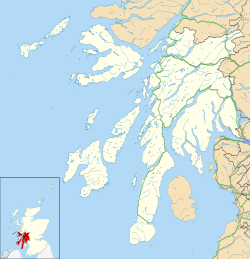Ormsary
| |
|---|---|
Location within Argyll and Bute | |
| OS grid reference | NR740724 |
| Council area | |
| Lieutenancy area | |
| Country | Scotland |
| Sovereign state | United Kingdom |
| Post town | LOCHGILPHEAD |
| Postcode district | PA31 |
| Police | Scotland |
| Fire | Scottish |
| Ambulance | Scottish |
| UK Parliament | |
| Scottish Parliament | |
Ormsary (Scottish Gaelic : Ormsaraidh) is a hamlet in Knapdale, Argyll and Bute, Scotland. [1]
